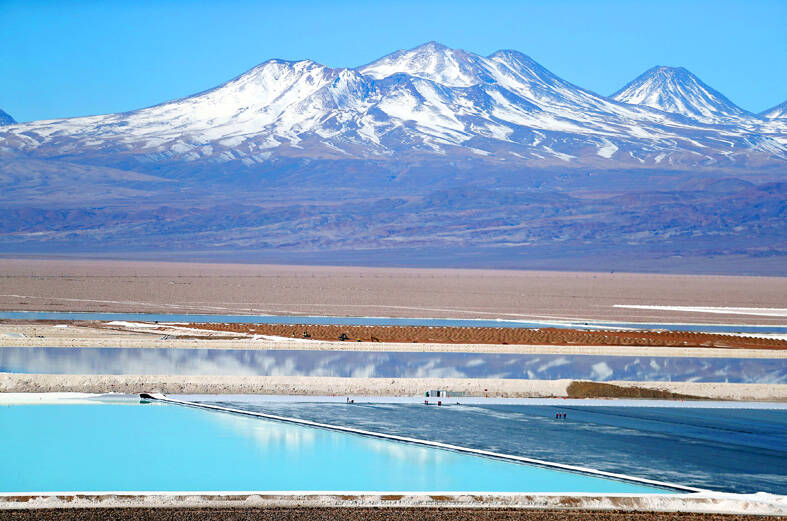Chilean President Gabriel Boric on Thursday said that he would nationalize the nation’s lithium industry, the world’s second-largest producer of the metal essential in electric vehicle batteries, to boost its economy and protect its environment.
The shock move in the country with the world’s largest lithium reserves would in time transfer control of Chile’s vast lithium operations from industry giants SQM and Albemarle to a separate state-owned company.
It poses a fresh challenge to electric vehicle (EV) manufacturers scrambling to secure battery materials, as more countries look to protect their natural resources. Mexico nationalized its lithium deposits last year, and Indonesia banned exports of nickel ore, a key battery material, in 2020.

Photo: Reuters
“This is the best chance we have at transitioning to a sustainable and developed economy. We can’t afford to waste it,” Boric said in an address televised nationwide.
Future lithium contracts would only be issued as public-private partnerships with state control, he said.
The government would not terminate current contracts, but hoped companies would be open to state participation before they expire, he said, without naming Albemarle and SQM, the world’s No.1 and No.2 lithium producers respectively.
SQM’s contract is set to expire in 2030 and Albemarle’s in 2043.
SQM, formally called Sociedad Quimica Y Minera de Chile, and Albemarle supply Tesla Inc, LG Energy Solution Ltd and other EV and battery manufacturers.
Albemarle said the announcement would have “no material impact on our business,” and it would continue talks on investing in further growth and using new technologies in Chile.
SQM was not immediately available for comment.
South Korean battery maker SK On, which has a long-term supply contract with SQM, said it would monitor the development and respond with a long-term view.
The announcement by Chile did not trigger a reversal in lithium prices, which have plunged more than 70 percent from a November peak due to weakening EV demand in China, the world’s biggest auto market.
“When or if battery makers renew their contracts with lithium firms in Chile, contract conditions would likely become more difficult than what they saw in the past when there was no state involvement,” Samsung Securities analyst Cho Hyun-ryul said.
The move is likely to spur a shift in future investment in lithium to other countries, including Australia, the world’s biggest producer, analysts said.
“Policy stability is very important for any mining project... Mining-friendly jurisdictions like Australia would be places where incremental funds get invested,” said Harsh Bardia, an analyst at National Australia Bank’s private wealth arm JBWere.
Boric said that state-owned Codelco, the world’s largest copper producer, would be tasked to find the best way forward for a state-owned lithium firm and he would seek approval from congress for the plan in the second half.
Codelco and state miner Enami would be given exploration and extraction contracts in areas where there are now private projects before the national lithium company is formed.

Taiwan Semiconductor Manufacturing Co (TSMC, 台積電) yesterday said that its investment plan in Arizona is going according to schedule, following a local media report claiming that the company is planning to break ground on its third wafer fab in the US in June. In a statement, TSMC said it does not comment on market speculation, but that its investments in Arizona are proceeding well. TSMC is investing more than US$65 billion in Arizona to build three advanced wafer fabs. The first one has started production using the 4-nanometer (nm) process, while the second one would start mass production using the

When an apartment comes up for rent in Germany’s big cities, hundreds of prospective tenants often queue down the street to view it, but the acute shortage of affordable housing is getting scant attention ahead of today’s snap general election. “Housing is one of the main problems for people, but nobody talks about it, nobody takes it seriously,” said Andreas Ibel, president of Build Europe, an association representing housing developers. Migration and the sluggish economy top the list of voters’ concerns, but analysts say housing policy fails to break through as returns on investment take time to register, making the

‘SILVER LINING’: Although the news caused TSMC to fall on the local market, an analyst said that as tariffs are not set to go into effect until April, there is still time for negotiations US President Donald Trump on Tuesday said that he would likely impose tariffs on semiconductor, automobile and pharmaceutical imports of about 25 percent, with an announcement coming as soon as April 2 in a move that would represent a dramatic widening of the US leader’s trade war. “I probably will tell you that on April 2, but it’ll be in the neighborhood of 25 percent,” Trump told reporters at his Mar-a-Lago club when asked about his plan for auto tariffs. Asked about similar levies on pharmaceutical drugs and semiconductors, the president said that “it’ll be 25 percent and higher, and it’ll

CHIP BOOM: Revenue for the semiconductor industry is set to reach US$1 trillion by 2032, opening up opportunities for the chip pacakging and testing company, it said ASE Technology Holding Co (日月光投控), the world’s largest provider of outsourced semiconductor assembly and test (OSAT) services, yesterday launched a new advanced manufacturing facility in Penang, Malaysia, aiming to meet growing demand for emerging technologies such as generative artificial intelligence (AI) applications. The US$300 million facility is a critical step in expanding ASE’s global footprint, offering an alternative for customers from the US, Europe, Japan, South Korea and China to assemble and test chips outside of Taiwan amid efforts to diversify supply chains. The plant, the company’s fifth in Malaysia, is part of a strategic expansion plan that would more than triple